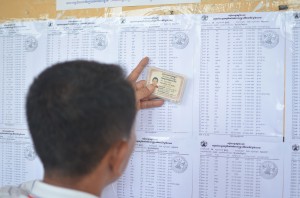Prime Minister Hun Sen on Monday appealed to Cambodia’s 9.6 million eligible voters to register to cast their ballots when enrollment opens next month, as the opposition CNRP expressed concerns that a million migrant workers could be disenfranchised.
As part of the 2014 political deal between the CPP and CNRP, a new bipartisan National Election Committee (NEC) was created with a mandate to build a new electronic voter list without the hundreds of thousands of double and missing names that plagued previous lists.

Mr. Hun Sen, speaking at a ceremony for a new bridge in Kandal province on Monday, said that those who do not register when NEC officials travel the country from the start of September to the end of November would not be able to vote in next year’s commune elections.
“Understand clearly: You should not think that you already voted five times, so you have your name on the voter list already,” Mr. Hun Sen said. “We have to make a new voter list by registering a new registry for those who have voting rights.”
“I take this opportunity to call on our citizens to re-register their rights as their country’s masters to vote for any party they like,” he added.
“Even I have to re-register. If not, I will not only lose the right to vote, but I will lose the right to stand as a candidate.”
About 9.6 million Cambodians are now eligible to vote, according to NEC estimates, with the next elections due on June 4, when 1,644 commune council seats will be up for grabs. The next national election is due on July 29, 2018.
The commune elections will provide the first test of support for the CPP and CNRP since the disputed 2013 national election, which led to the deal that created the new NEC, and will also be important in locking in the local-level administrative bodies until 2022.
CNRP lawmaker Mu Sochua said the opposition was concerned that more than 1 million Cambodians working abroad may be disenfranchised, and that it would send a team to Thailand this month to urge them to return home to register.
“There’s close to 1 million migrant workers in Thailand, and we will be going to the main areas, like Pattaya, Aranyaprathet and Chanthaburi, and we will be meeting representatives from these areas. The only reason is to tell them to register for voting,” Ms. Sochua said.
“We are going to also listen to them about the challenges and difficulties they face in order to come back, and speak to the NEC and the Ministry of Labor to see what kind of interventions must be done vis-a-vis the Thai government, or with the NEC,” she said.
NEC spokesman Hang Puthea said enrollment would take place in each of Cambodia’s current 1,633 communes—11 new ones will come into existence in 2017—and that people would have to vote in the commune in which they register for the local elections.
Migrant workers will only be able to vote if they return to Cambodia during the registration period and enroll in the communes listed on their national ID cards, or where they rent rooms or reside according to their government-issued family books.
“If they cross the border into Poipet and, for example, they rent [a house] in Poipet or have records of living with relatives there, they will be eligible to register in that area, or else they will need to travel to register at the place recorded on their ID cards,” Mr. Puthea said.
“Where they register is where they vote.”
The CNRP has written to the NEC asking it to continue voter registration during the Pchum Ben holiday from September 30 to October 3, when most people typically return to their home villages to pay respect to their ancestors.
Koul Panha, executive director of the Committee for Free and Fair Elections, said he feared that the hundreds of thousands of mostly poor Cambodians working in Thailand, South Korea and Malaysia could lose their right to vote if more convenient arrangements were not made.
“There could be problems if workers can return only for the holidays, and then go back and miss the voter registration. That’s why the NEC should have a special team to register people living abroad when they come back for Pchum Ben,” Mr. Panha said.
He said that even if registration were to take place over the holiday, many migrant workers could still be unable to return due to their jobs.
“I do not think all of them will return—but even if it’s only some, they should be registered,” he said.
Mr. Puthea said the NEC still had not made a decision on whether to make such arrangements.
“The issue is that the voter registration officials are bound by contract to do registration…during days that exclude Saturday and Sunday,” he said. “They will only have the Pchum Ben days off, so we might be accused of abusing their rights by asking them to work.”